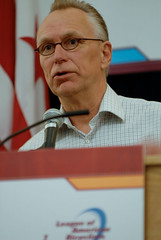“We as a society need to address and reinforce that driving and bicycling requires full concentration on the road, unfettered awareness of roadway conditions and instant attention to non-motorized roadway users.”
–Jerry Norquist, in a letter to ODOT
The Oregon Bicycle and Pedestrian Advisory Committee (OBPAC) has sent a formal letter to the Oregon Transportation Commission (OTC, a Governor-appointed body that advises the Oregon Department of Transportation) urging them to step up their efforts to educate the public about the dangers of distracted driving and to support a ban on the use of cell phones while driving and bicycling.
In the letter, dated March 16 and signed by committee Chair Jerry Norquist, the OBPAC “urges” the ODOT to support the agenda of the National Safety Council, a group calling for governors and legislators in all 50 states to ban cell phone use while driving. The OBPAC also wants ODOT to add information about the dangers of distracted driving to the DMV manual for both commercial and non-commercial road users.
Oregon currently has no law on the books regarding the use of cell phones while driving. In the 2007 legislative session, several different bills were proposed, but none of them moved very far. On Monday, the House Transportation Committee will hear House Bill 2377, which prohibits use of a “mobile communications device” during the operation of a motor vehicle.

The bill, sponsored by Representative Carolyn Tomei (D-Milwaukie), would make it illegal to text message or talk on a cell phone, but makes an exception for hands-free devices (as well as people operating farm equipment and emergency vehicles). The bill also makes the infraction only a secondary offense, meaning that a police officer could enforce the law only after a motor vehicle operator was pulled over for some other offense.* (*I regret this error. I read the bill wrong. Tomei’s bill does make it a primary offense.)
Here is an excerpt from the bike/ped committee’s letter:
We as a society need to address and reinforce that driving requires full concentration on the road, unfettered awareness of roadway conditions and instant attention to non-motorized roadway users. Heightened attention is particularly important in adverse weather and reduced lighting conditions, common on Oregon’s roadways. Oregon’s drivers need to take responsibility for their driving behavior and the safety of all roadway users…
…We recognize that this will not be a magic end to all distractions on the roadways, but we need to address this issue now.
Along with their letter to ODOT, the bike/ped committee included a fact sheet about cell phone use while driving that was prepared by the National Safety Council. Here are a few of those facts:
- Drivers who use cell phones are four times more likely to be in a crash while using a cell phone. (1997 New England Journal of Medicine examination of hospital records and 2005 Insurance Institute for Highway Safety study linking crashes to cell phone records).
- There is no difference in the cognitive distraction between hand-held and hands-free devices. (Simulator studies at the U. of Utah support this finding.)
- Cell phone use contributes to an estimated 6 percent of all crashes, which equates to 636,000 crashes, 330,000 injuries, 12,000 serious injuries and 2,600 deaths each year. (Harvard Center of Risk Analysis).
- 80 percent of crashes are related to driver inattention. There are certain activities that may be more dangerous than talking on a cell phone. However, cell phone use occurs more frequently and for longer durations than other, riskier behaviors. Thus, the #1 source of driver inattention is cell phones. (Virginia Tech 100-car study for NHTSA)
Oregon is way behind in passing legislation that helps prevent distracted driving. Tomei’s bill lacks the real teeth needed to make an impact, but it’s a start*. If you care about this issue, consider contacting your representative and making your opinion known.
Legislation like this is also another great reason to join Jerry Norquist and many others at the Oregon Bike Summit next week (4/21 – 4/22).
(*4/23 update: I was mistaken in my reading of Tomei’s bill and I am working on a follow-up story. It has more “teeth” than I originally reported. Sorry for any confusion.)


